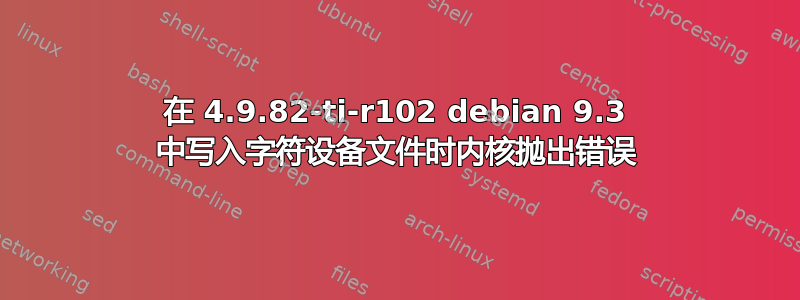
我成功地在文件夹下创建了设备文件/dev,但是写入该设备文件会使内核抛出以下错误消息。
Message from syslogd@beaglebone at Feb 26 15:40:10 ... kernel:[10090.943733] Internal error: : 1b [#3] PREEMPT SMP ARM
Message from syslogd@beaglebone at Feb 26 15:40:10 ... kernel:[10091.049020] Process echo (pid: 3728, stack limit = 0xdc40a218)
Message from syslogd@beaglebone at Feb 26 15:40:10 ... kernel:[10091.054880] Stack: (0xdc40be60 to 0xdc40c000)
Message from syslogd@beaglebone at Feb 26 15:40:10 ... kernel:[10091.059267] be60: c15491c6 00000022 dc5cb14c bf30430c dc40bedc dc40be88 c075312c c074fe5c
Message from syslogd@beaglebone at Feb 26 15:40:10 ... kernel:[10091.067488] be80: c0753018 ffffff04 ffff0a00 c140414c c0d407c8 bf30430c c140414c 40cfbcf3
Message from syslogd@beaglebone at Feb 26 15:40:10 ... kernel:[10091.075709] bea0: 00852878 ffffff04 ffff0a00 00040952 c01a7404 c140414c 00852878 00852878
Segmentation fault
我了解非常基本的 Linux 设备驱动程序
谁能帮我解决这个问题吗?
我附上用于字符文件写入的代码片段
#include<linux/kernel.h>
#include<linux/init.h>
#include<linux/module.h>
#include<linux/fs.h>
#include<linux/uaccess.h>
#include<linux/device.h>
MODULE_AUTHOR("RUCHA");
MODULE_DESCRIPTION("Character Driver First test");
MODULE_LICENSE("GPL");
MODULE_VERSION("0.0.1");
static int MajorNum;
static struct class* RetValOfClassRegistration = NULL;
static struct device* RetVal = NULL;
static char message[1024];
static int openDev(struct inode * , struct file *);
static int closeDev(struct inode * , struct file *);
static ssize_t readDev(struct file *, char *, size_t, loff_t *);
static ssize_t writeDev(struct file *, const char *, size_t, loff_t *);
static struct file_operations FileOps = {
.owner = THIS_MODULE,
.open = openDev,
.read = readDev,
.write = writeDev,
.release = closeDev,
};
static int registerCharDev(void){
return register_chrdev(0,"MyDev",&FileOps);
}
static int __init Loaded(void){
// registering device
MajorNum = registerCharDev();
if(MajorNum < 0){
printk("Can not register device\n");
return -1;
}
printk("Driver Loaded with %d \n",MajorNum);
// registering device class
RetValOfClassRegistration = class_create(THIS_MODULE,"MyCharacterDriver");
if(RetValOfClassRegistration < 0){
printk("can not register class for driver number : %d\n",MajorNum);
return 0;
}
// register the driver
RetVal = device_create(RetValOfClassRegistration,NULL,MKDEV(MajorNum,0),NULL,"MyDev");
return 0;
}
static void __exit Removed(void){
device_destroy(RetValOfClassRegistration,MKDEV(MajorNum,0));
class_unregister(RetValOfClassRegistration);
class_destroy(RetValOfClassRegistration);
unregister_chrdev(MajorNum,"MyDev");
printk("Driver Removed\n");
}
module_init(Loaded);
module_exit(Removed);
static int openDev(struct inode *inodep , struct file *filep){
printk("Device is now open to read write operations\n");
return 0;
}
static int closeDev(struct inode *inodep , struct file *filep){
printk("Device Closed\n");
return 0;
}
static ssize_t readDev(struct file *filep, char *c, size_t v, loff_t *lp){
printk("Read From the device\n");
return 0;
}
static ssize_t writeDev(struct file *file, const char __user *buf, size_t len, loff_t *offset)
{
sprintf(message, "%s(%zu letters)", buf, len);
return 0;
}
我给出的用户输入是通过 echo 命令
回声“1”> /dev/MyDev
请帮助我解决这个问题!
答案1
正如我所说......问题出在你的字符驱动程序的write功能上。更具体地说,您直接从用户空间访问缓冲区。你不应该这样做——内核有一个特定的 API 可以做到这一点。例如参见这个StackOverflow 帖子关于这个话题。
对于您的具体情况,您应该删除sprintf并使用copy_from_user将数据从用户空间缓冲区复制到驱动程序的缓冲区中。像这样的事情解决了我的 beaglebone 黑板上的问题:
static ssize_t writeDev(struct file *file, const char __user *buf, size_t len, loff_t *offset)
{
printk("Write to device buf: 0x%p: len = %d, offset = %lld\n", buf, len, *offset);
if (copy_from_user(message, buf, len)) {
printk("Unable to read buffer from user\n");
return -EFAULT;
}
return len;
}


